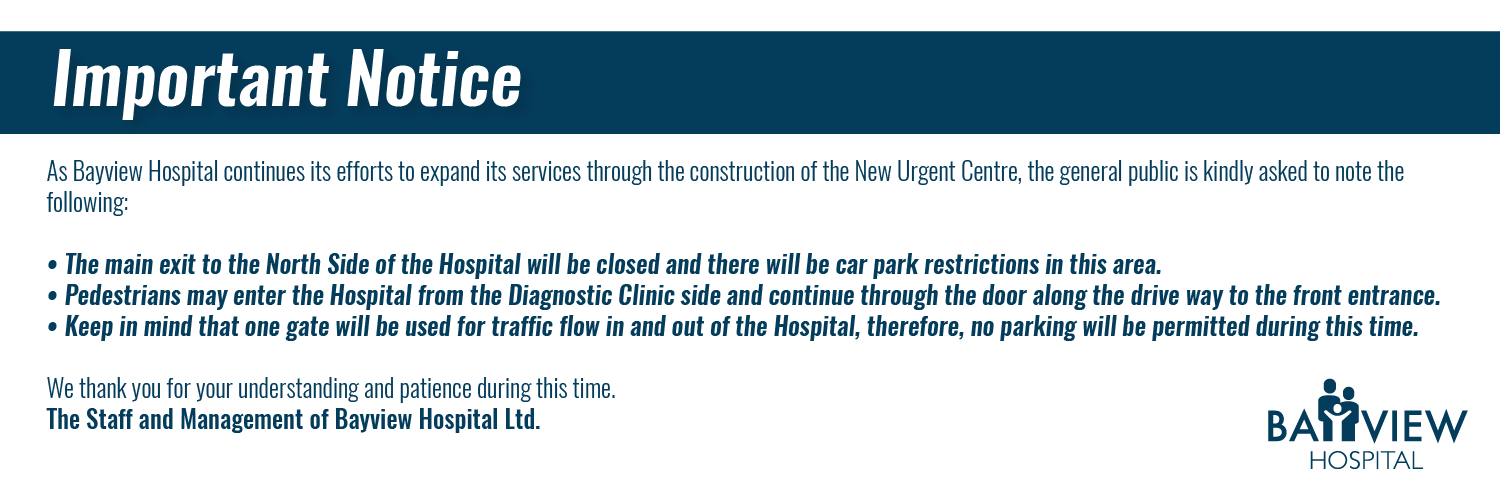Bayview Hospital's website uses cookies so that we can provide you with the best user experience possible. Cookie information is stored in your browser and performs functions such as recognising you when you return to our website and helping our team to understand which sections of the website you find most interesting and useful.
World Health Day Message
THE IMPORTANCE OF rest, exercise and good nutrition cannot be overemphasized if Barbados is to avoid the ever-increasing costs of secondary and tertiary healthcare, says Dr Brian Charles.
In giving details on the wellness programme which he is offering as managing director of Coverley Medical Centre, Charles says the public healthcare which generations of Barbadians had taken for granted was no longer sustainable; but one of the ways to reduce future costs could be via a general wellness programme.
“I spent 21 years in the public health system…and now that I’m in the private system, I see that everything has a cost. We cannot sustain the public free health care system no matter how unpleasant it will be to civil society. It’s going to have to change at some point in time. “General wellness is a way to start, so that less people will need secondary and tertiary care, thereby reducing costs. It’s not very sexy to talk about attacking it at the base, at the primary level, but it is necessary,” Dr. Charles says in an interview on the threshold of World Health Day, April 7.
”Typically the health professional has been known as an agent to help persons when they’re sick, so we tend to concentrate on illness. We go to medical school and learn about diseases and how to cure them, and the different levels of health care, which are primary, secondary and tertiary; primary being the preventative aspect, secondary being where intervention is used to treat illness, and tertiary being hospital and specialist level care. As far as our efforts are concerned, we should be moving toward primary health care,” said Dr. Charles, who is also managing director of Sandy Crest Medical Centre.
The thinking behind Dr. Charles’ reinforced wellness plan stems from the recent Estimates debate where the expense of health care was emphasized and Members of Parliament basically reiterated that no Government could continue to support totally free health care for the general and ageing population.
“In this free environment, someone still has to pay, especially for tertiary care processes such as advanced radiological investigations, ultrasounds, CAT scans, MRIs, as well as advanced procedures like transplants, dialysis and heart and brain surgeries,” says Dr. Charles. “Those are all very expensive. And they are targeted toward a few; so tertiary care is at the top of the pyramid where it deals with a few people, while primary care is at the bottom where the pyramid is wide. So the base of health care should be focused on primary care,” Dr. Charles explained.
Aiming for good primary health care and a reduced need for a large quantity of secondary and tertiary care in mind, the focus is on wellness medicine at Coverley.
Risk Factors
“Wellness medicine is a concept whereby the individual takes ownership of his or her health. For example, the highest morbidity and mortality – meaning the disease that causes the most death and suffering in the Western Hemisphere – comes from cardiovascular disease and strokes. So what are the risk factors for strokes and heart disease? There are risk factors that are modifiable and some that are not,” said the former head of the Accident & Emergency department of the Queen Elizabeth Hospital.
Since the non-modifiable ones are ageing, race and genetics, Dr Charles notes, the modifiable risk factors are obesity, hypertension, diabetes, smoking and alcohol consumption which can all be controlled in order to prevent the complications leading to the need for secondary and tertiary care.
“This is applicable from children right up to the elderly; so no person in the society is exempt,” he adds. “Let us take, for instance, a 23-year-old man. If he is sedentary, like a lot of jobs we have, and does nothing but desk work, and when he goes home he watches television all evening until bedtime, and repeats that in a cycle, then he, at that young age of 23, is setting himself up for dire consequences.
“That same man, when he reaches about 45, will transform into the age where heart disease and stroke, because of the risk factors that have been allowed to accumulate, will start to have effects. So, the younger person with the lifestyle I just illustrated shows no effects until he gets to what I call that magic age, where his metabolism starts to work in a different way.
“Because of the arterosclerosis, which is a process of depositing fat in the arteries, causing the arteries to narrow – although you show no outward effects at first – the space in the arteries gradually gets smaller, making the heart work harder to push blood through them to feed your vital organs.
“The heart is now working harder, so at the age of 40-45 that once-healthy 23-year-old starts to get hypertension, which is a direct risk factor for stroke and heart disease,” is how Dr Charles puts it.
Furthermore, as a result of poor eating, lack of exercise and increased weight, that man may then develop diabetes – an impairment of the metabolism of the sugar in the body. Diabetes is an imbalance between the use of sugar and the input of sugar, and if the body cannot use that sugar, it is deposited in the cells and the metabolism in the cells start to break down.
“So healing is impaired, the ability of the body to fight infection is impaired, growth and repair from injury is impaired. That 45-year-old who was a healthy 23-year-old living well now has those effects, and with those effects come the complications,” he added.
It is such a gradual process that one hardly knows it is happening; hence the term “silent killer” and the reason why Dr Charles and his team at the three-year-old Coverley Centre are targeting those from very young ages in the wellness medicine programme.
So what is so radically different about wellness medicine?
Primary or wellness medicine, addresses physical, spiritual and emotional wellbeing and is suited to any age, thereby encouraging schoolchildren to be physically active instead of spending all of their free time before a television or video console.
“They are very sharp with the eye-hand coordination but they’re not physically well. They learn from a young age that when they’re not busy they can sit and do mind games, so the physical aspect suffers. Parents may say, in these days, they don’t feel safe with their children running around on a pasture or leaving the child on the school premises after school to play. It’s a different environment that’s symptomatic of the age we’re living in,” he adds, noting that while it was a challenge, it was not impossible.
As for the busy career-oriented adults who simply “don’t have the time”, Dr Charles and those at Coverley ask for a 24-hour breakdown of their activities. “I tell them all we need to do is spend 30 to 40 minutes a day dedicated to activity where you raise your heart rate and get a nice little sweat. And that only has to be done for four days a week. If you’re watching more than an hour of TV after work on evenings, who benefits from that,” he asks.
The need for proper nutrition and rest
“The most important meal of day is breakfast. People who want to lose weight feel that skipping breakfast is advantageous; it is not. You’ve spent the whole night not eating, you awake and your hormones have prepared the body for the day and they expect to be provided with some fuel for the day, and that fuel would be breakfast. If you don’t give fuel to the body after that long period of resting overnight, then the body interprets it as being in a stress mode. So when you skip breakfast, you automatically go into a stress mode,” Dr Charles explains.
“If you’re stressed, you are unable to perform optimally because your body is prepared for the fight-and-flight response. The body, under stress, secretes hormones that make it ready to absorb any nutrition that comes however it comes, and deposit it as storage. Storage is fat,” he adds.
He advises that the best way to handle good nourishment is not to diet, but to eat well. This would entail adequate carbohydrates, mainly starchy foods, which provide fuel and energy.
The more processed the food, however, the worse the carbohydrate content. Hence, if you go to the supermarket and look at sweet potatoes, yams and breadfruit, as well as rice, macaroni and pasta, be aware that the first three are non-processed foods and “very good carbs”, while the last three are processed and not good carbs though they can provide adequate levels of energy.
“Then there are the super-processed foods, containing sugar. Sugars are very, very bad! We should attempt to eliminate as much processed sugar from our diet as possible. It provides you with quick energy, that’s all. Flour is also processed, and most persons eat white flour. If you have to eat breads, use wholewheat or brown bread,” he says.
Proteins are also essential to build and repair muscle, while fibre in terms of vegetables and fruits, though often prohibitive in cost – should be a part of every meal.
“Fats are also important in our diet, because every single cell in our bodies is made up of a portion of fat. So we need fats in our diet to sustain good operation of the body. But there are good and bad fats. The good ones are contained in nuts and olive oil, and the bad are contained in butter and lard. Certainly not fried foods! If you must, have a fried meal once a week or less, and fry in olive oil,” is how the doctor and consultant put it.
Finally, Dr Charles advises clients to consume enough water to ensure that the urine is pale yellow. The much-touted eight litres is too much unless one is an athlete, he stresses.
As far as rest and avoidance of stress are concerned, adults ideally need between six and eight hours of sleep in a 24-hour period, since regeneration of cells and recharging of the brain are best done while resting.
“Most studies support that at least eight hours’ sleep is better. In January this year, a study was published stating that persons with less sleep tend to be more overweight,” adds Dr. Charles.





No comments so far!